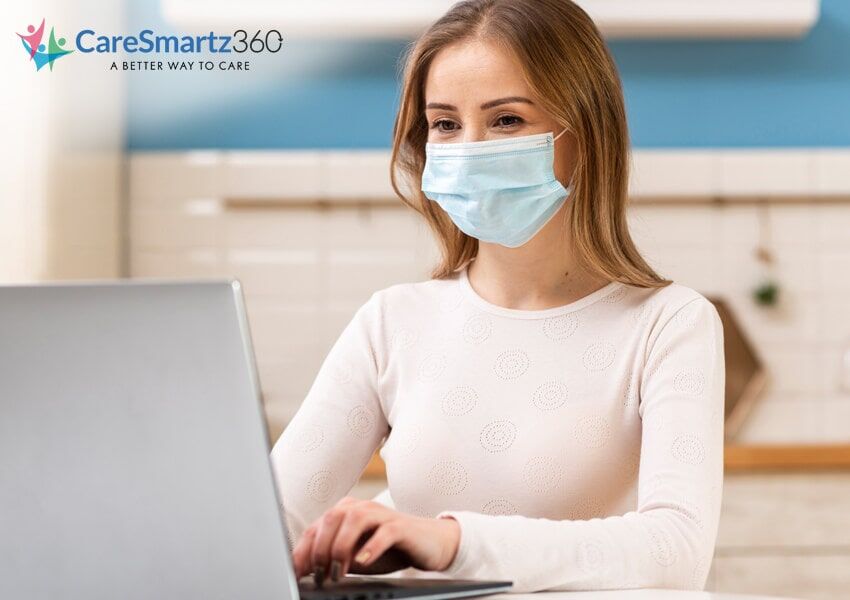
The home care industry has been abruptly impacted by the global pandemic, COVID-19, which is continuously surging across the United States.
During this crucial time, the demand for caregivers is increasing each day and home care agencies are going through a tough time in managing the overall care delivery.
Caregivers, on the other hand, are uneasy about delivering care due to the fear of contamination while they are on their shifts.
While most of the experienced caregivers are assigned to clients with COVID-19 symptoms; the ones requiring care for daily chores are also facing issues.
Options like remote care delivery can be a temporary solution for the ones seeking general care in household tasks, but the fact that caregivers delivering care for the suspects are at a higher risk of infection can’t be overlooked.
The CDC and the World Health Organization are monitoring the current outbreak and have released certain guidelines for home care agencies and caregivers to ensure safety without hampering the overall quality of care.
CareSmartz360 understands the complexity of the situation for agencies, caregivers, & clients and we’ve compiled the crucial information in the form of a checklist to simplify care delivery for the caregivers during the pandemic.
Though caregivers are always concerned about the overall well-being of a client, the pandemic situations demand extra effort.
The ones caring for the seniors with medical issues or foreign travel history need to ensure they take adequate preventive measures to ensure they are safe at their place while making sure you don’t get infected.
Here’s what you need to take care of while delivering care:
You may be surely aware of the use of face masks, gloves, and hand sanitizer whenever you are on duty but most of the individuals aren’t yet aware of its proper use.
The mask that you are wearing shouldn’t be loose and must fit properly and tightly on your face.
Furthermore, if you are unable to find a hand sanitizer, don’t panic. Washing hands with soap and water for a minimum of 20 seconds can eliminate any chance of infection.
Follow the right technique of washing your hands from the front, back, and inside the fingers to make sure they’re cleaned properly.
Home care agencies are trying hard to make the PPE available for their caregivers and it is your responsibility to use them wisely.
You may also seek PPE through your agency if you are having any issues in managing PPE.
Download the Free Video that Helps Caregivers to Deal with the Pandemic Efficiently.
Regular monitoring of symptoms in the elderly is crucial for the caregivers to ensure they are protected from infection.
The common flu-like symptoms can vanish in a couple of days but if the health condition becomes severe, it is strictly advised to seek medical help. Call 911 if the symptoms are severe.
Also, the caregivers need to report the same to the agencies so that they can maintain a record and manage their operations accordingly.
It is important to analyze the symptoms of the seniors that are under quarantine or are facing health-related issues.
Regular monitoring and adequate symptom treatment should be your biggest priority as a caregiver. If you notice an improvement in the symptoms, you need to carry on the same as there’s no chance of COVID-19 infection.
In case the symptoms get worse, it is strictly advised to seek emergency help from the nearest medical center by calling the emergency helpline released by the state.
Here are the symptoms that you need to consider:
As per the WHO and the CDC, the symptoms may be witnessed from 1 to 14 days of the infection and the infected individual could be seen normal without any medical condition.
The caregivers also need to take adequate care of themselves whenever any of their clients are suspected of the novel coronavirus symptoms. As we’ve already discussed, you need to use appropriate PPE for self-protection against the infection.
Cleaning the home and using adequate disinfectants is a crucial part of delivering care. This prevents any chance of contamination through any means in the house and protects the elderly who are more prone to infection due to less immunity.
It becomes crucial to pay close attention to the overall cleanliness of the room when someone is sick and is showing symptoms of COVID-19 infection.
Apart from this, the caregivers need to ensure that if they are doing laundry, they must use appropriate disinfectant to ensure the clothes are free from any bacteria or viruses.
You can refer to the official cleaning and disinfecting guide offered by CDC for detailed information.
You must ensure that you follow social distancing strictly. Also, remind the elderly regarding social distancing frequently so that they don’t risk their lives just because of their social nature.
These precautions will not only protect the other members of the home but can help ensure your safety against the exposure.
One of the crucial aspects associated with COVID-19 is the circulation of unjustifiable myths. You need not only stay away from such rumors but also make sure that the seniors aren’t believing any of these myths associated with coronavirus.
People are trusting rumors that are depicting the ways to prevent the infection or even cure the disease by simple home remedies, which aren’t approved either by the CDC nor the WHO.
These myths can be quite risky for the ones who are not following the guidelines and unknowingly risking the lives of others.
Caregivers, being a crucial part of the entire society, are undeniably on the front line of the war against the COVID-19 outbreak.
The social responsibilities of caregivers surging every day with more and more elders getting sick and requiring care. Caregivers must ensure they are well prepared to deal with the pandemic situations and follow the Federal Government guidelines strictly.
Our users reported 95% customer satisfaction in 2024. Schedule a personal walkthrough to see CareSmartz360, home care software in action.